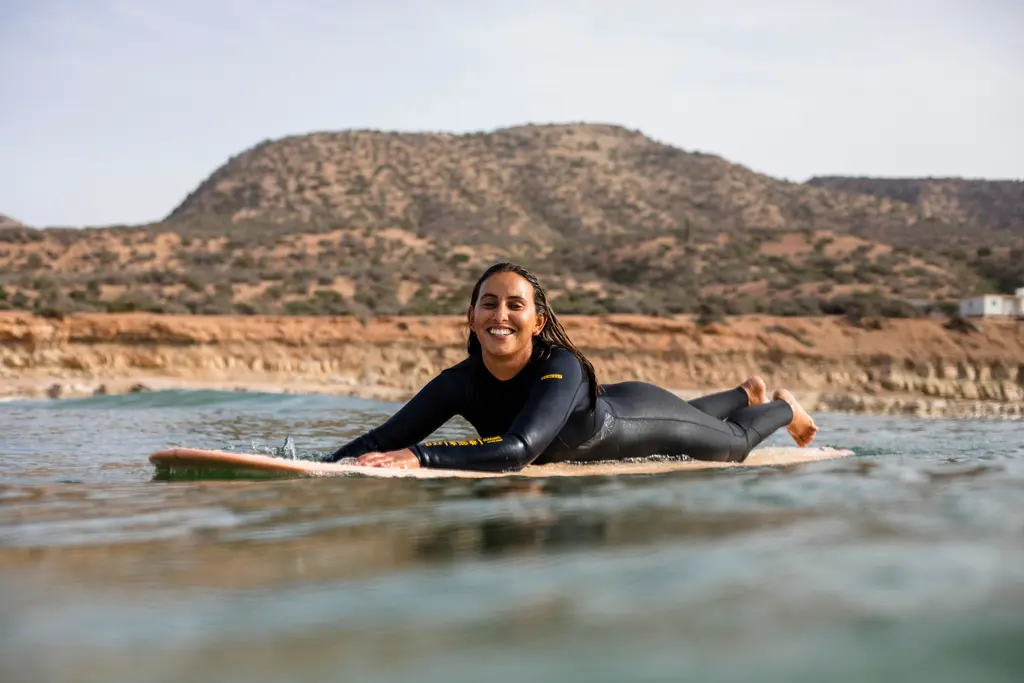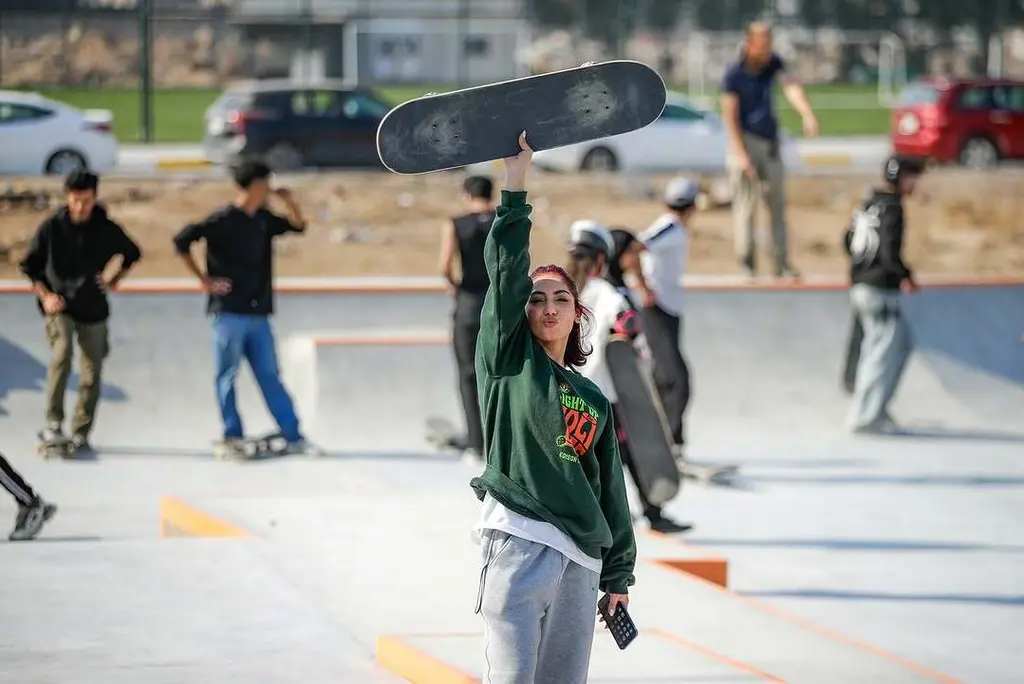‘When I rode again for the first time, it felt like freedom’
- Text by Guillaume Le Goff
- Photography by Denny Pham

Skateboarding and surfing may be solo pursuits – but they’re mostly experienced in groups. And as with all group things, they were also a big no-no during lockdown: killer waves went unridden, sidewalks were left untouched. But as things loosen up and summer swings into action, many skaters and surfers are now experiencing a kind of rebirth. So what’s it like to get back out there, even as the deadly plague still hovers? Here’s a splattering of takes from across Europe.
How did you experience lockdown?
Jeanne Duval (Pro Skateboarder – Nantes): I was fortunate to be in the countryside and not locked up in a city apartment. I skated the same sidewalk during those two months! I tend to live with the pressure of time, but with Covid-19 I was forced to stop everything. It was a step back that I would’ve never had the opportunity to take otherwise.
Denny Pham (Pro Skateboarder – Berlin): The guidelines in Berlin were not as strict as elsewhere. We were still allowed to leave the house for pretty much whatever reason or do individual sports as long as we respected the required distance. I enjoyed the fact that roads and sidewalks in Berlin were almost completely empty. The best thing was that we could ride a handful of spots that you could never skate before because of big crowds and security. But of course, seeing friends and businesses suffering under Covid-19 was and still is horrible.
Samuel Partaix (Pro Skateboarder – Biarritz): I didn’t skate at all for two months except for once on a curb down the street from my house. I was immediately fined 135 euros by the police.
Gibus De Soultrait (Surf Editor – Guethary): I have a few anecdotes. At the start of lockdown, it was a full moon, and there were between five and 10 surfers in the middle of the night on some good spots. Then there were surfers who were hitting hidden spots in Gironde, passing through the forest, who ended up being caught by a gendarmerie helicopter. The gendarmes took their smartphones and three days later rang the doorbell with the fine. There was also this helicopter that crisscrossed the coast on weekends and pounced on people who were on the shore to give them a fine of 135 euros.
But generally speaking, most surfers respected the lockdown. We saw beautiful waves crash empty. Like animals, they were free, nobody to throw surfboards on their faces!
Adilson Pedro (Skater – Lisbon): It was hard because I could only skate alone at this one small spot… but at least I managed to learn some new tricks, and that felt great.
What was it like to get back out there when lockdown ended?
Yann Garin (Skateboard filmer – Paris): It felt like liberation, freedom!
Samuel Partaix: Physically, it wasn’t easy. The first session was delicate – but it was so pleasant! I also just rode my bike from Biarritz to Bordeaux with another pro skateboarder friend, Oscar Candon. We rode 200km just to see friends and skate together. What a feeling!
Lee-Ann Curren (Pro Surfer – Biarritz): I was really happy to return to the water, whatever the conditions, and to feel the physical state of bliss after surfing. I lost the condition a little but gained in freshness and motivation.
Tristan Mausse (Surfer – Biarritz): It felt like freedom, like a reunion with a person who is dear to us. A greater sensitivity for details that become trivial over time: lights, smells, sounds… The first days of surfing did not offer excellent conditions, but the important thing was to be in the water.

And what about the risks of getting out there?
Lee-Ann Curren: In surfing, even if we seem to be crowded from afar, there’s always a certain distance from others so I don’t worry about the water. Plus, I think that sea air is good for morale, for the body and for the immune system.
Tristan Mausse: To enjoy surfing it’s better not to be glued to other surfers anyway, so this isn’t actually a big change. I think the surfers here are so concerned with the right to be able to surf that they try to respect the ‘rules’ as much as possible so that the beaches are not closed to them.
Gibus De Soultrait: The debate on the reopening of beaches has been interesting. The French government didn’t want to open them until June 1. Club surfers, elected surfers, the surf federation denounced this nonsense because the mountain was also open for walks. Finally, the government left it up to the mayors with the prefects for each department. They have implemented the principle of ‘dynamic beach’, which means you can walk, go to the water to surf, swim – but you cannot sunbathe on your towel and be in a crowd.
Jacob Sawyer (Slam City Skates – London): I blame ambiguous directives for many people carrying on as normal, but my family and I have been careful. Recent exercise breaks have been at the skate park but always with one or two other people early in the morning before anyone is out. Everyone keeps their distance, and the elbow bump has made a comeback as the greeting of choice. I know the authorities passed through one afternoon and dispersed people out playing basketball but saw nothing wrong with the crew who were there skating, which tells you it’s not a rave situation down there. I see clips of my friends out skating solo or with a small crew. No one is doing anything crazy.
How do you see your community adapting to the post-Covid-19 world?
Denny Pham: Tough times inspire people to get creative. Maybe this could be the beginning for some new local projects with national focus as long as travelling stays limited. I’m not too sure how well the industry will withstand this economic setback, but I can imagine that skateboarding as a sport or activity will welcome a lot of new beginners after Covid-19, just because it’s an individual sport and people will be more careful with activities in a crowd. Besides that, I think this is a great time to realise once more what a valuable community we have, where we can all support each other or receive support from others just because we’re following the same passion.
Lee-Ann Curren: This is a difficult question because the future has never been so blurred! I think that certain habits will surely return, while others – small discoveries that we had the time to make in confinement, ways of working remotely, for example, cooking, consuming differently – they’ll still have an impact on the direction we go next.
Gibus De Soultrait: Surfers are ‘consumers’ of waves, like all consumers of the world today. They want to take the plane to travel, and at the same time, they agree to eat organic and fight against CO2 emissions. But they can also be frugal if they have their boards and waves. The surfers of the ’70s lived simple lives and travelled for long periods – not a week in a surf camp at 400 euros per night on the other side of the planet! We’ll see. Everyone is trying to have a life that makes sense to them. We have to get out of 100 per cent economic neoliberalism, but we also have to invent what can partially replace it in order to continue to have a society, to create a living together. This pandemic has allowed us to think, and that’s already a very good thing.
Jacob Sawyer: One of my worries, when this all went down, was how law enforcement would handle things and any further insidious erosions of civil liberty down the line. I know I’m fortunate to be even entertaining these thoughts right now or talking about skating. I have friends who have lost loved ones from this whole situation, and it’s hardcore. But I have also noticed more people smiling out on the street these days, saying hello. I hope there’s more of that in the new world.
Some answers were edited for length and clarity.
Follow Guillaume Le Goff on Instagram.
Enjoyed this article? Like Huck on Facebook or follow us on Twitter.
You might like

At Belgium’s Horst, electronic music, skate and community collide
More than a festival — With art exhibitions, youth projects and a brand new skatepark, the Vilvoorde-Brussels weekender is demonstrating how music events can have an impact all year round.
Written by: Isaac Muk

Maryam El Gardoum is breaking new shores for Morocco’s indigenous surfers
The Amazigh Atlantic — Through her groundbreaking career and popular surf school, the five-time Moroccan champion is helping women find their places in the waves.
Written by: Sam Haddad

In Baghdad, skater girls are reshaping Iraqi womanhood
Baghdad is rad — As the city’s first skatepark opens, the new space is providing a blank canvas for its board culture. Dalia Dawood speaks to the people looking to make its ramps and rails a safe haven for women and girls.
Written by: Dalia Dawood

A new documentary spotlights Ecuador’s women surfers fighting climate change
Ceibo — Co-directed by Maddie Meddings and Lucy Small, the film focuses on the work and story of Pacha Light, a wave rider who lived off-grid before reconnecting with her country’s activist heritage.
Written by: Hannah Bentley

The rebellious roots of Cornwall’s surfing scene
100 years of waveriding — Despite past attempts to ban the sport from beaches, surfers have remained as integral, conservationist presences in England’s southwestern tip. A new exhibition in Falmouth traces its long history in the area.
Written by: Ella Glossop

Mark Gonzales
City Dreaming — Living skate legend Mark Gonzales radiates with imagination as he roams about the busy New York streets.
Written by: Jay Riggio